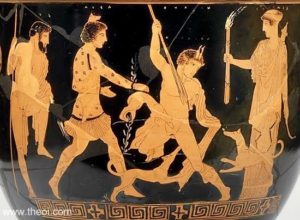Anger is a raw emotion that drives humans and animals alike to be hostile and aggressive. In Greek mythology, Lyssa was the goddess who personified that emotion and she was volatile and destructive.

Some people, under Lyssa’s influence, let fly an indignant tweet when they are angry. It is a bad idea for Lyssa is a notoriously bad advisor. She will compel you to make hasty pronouncements and bad decisions.
Anger like revenge, is an intricate dish that should simmer for some time and be consumed cold to be really gratifying.
A juvenile will tweet his anger, a grownup will hesitate, a president should not. The leader of a large organization should turn his tongue 7 times in his mouth before uttering anything. Saying something stupid is the role of the vice-president who can be conveniently disavowed when putting his boot in his mouth.
A leader shouldn’t talk before carefully reflecting on what he is about to say. Once set free, a tweet is like a wild bird that will breed, multiply and could become a destructive flock.
It does not mean that he should not get angry, but he should never tweet his indignation. A smart man should learn to slowly digest his anger and use it later in some smart, constructive way. It has been said, “anger is a condition in which the tongue works faster than the mind.” I believe that. A fast tongue is like a double-edged sword. It can cut both ways.
Insecurity and impotence are often the driving forces behind anger. Showing rage is like revealing your hand in a poker game. It is a sure way to lose.
Leaders should speak sparingly and carry a big Taser. When accusing and showing anger too many times, they become laughable comic characters that cannot be taken seriously.
“It is better to keep your mouth closed and let people think you are a fool than to open it and remove all doubt.” – Mark Twain



